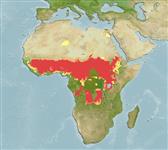Classification / Names
Common names from other countries
Main reference
Size / Weight / Age
Max length : 200 cm TL male/unsexed; (Ref. 58490); common length : 100.0 cm SL male/unsexed; (Ref. 34290); max. published weight: 200.0 kg (Ref. 3900)
Length at first maturity
Lm 74.3, range 53 - 85 cm
Environment
Freshwater; demersal; potamodromous (Ref. 51243); depth range 10 - 60 m (Ref. 34290)
Climate / Range
Tropical, preferred ?; 27°N - 7°S
Distribution
Africa: widespread throughout the Nilo-Sudan region of Africa, occurring commonly in all major river basins including the Senegal, Niger, Volta, Chad (Ref. 81285) and Nile (Ref. 3636). Found almost everywhere in West Africa, except in Gambia (Ref. 81285). Also present in the Congo basin and lakes Albert, Turkana/Rudolph and Tana (Ref. 3636). Several countries report adverse ecological impact after introduction.
Countries | FAO areas | Ecosystems | Occurrences | Introductions
Short description
Dorsal
spines
(total): 7 - 8;
Dorsal
soft rays
(total): 8-14. Diagnosis: mouth large and protrusible, lower jaw prominent; numerous villiform teeth present in jaws and on palate (Ref. 81285). Preorbital (Ref. 4967) and preopercle denticulate (Ref. 4967, 81285). A strong opercular spine present (Ref. 4967, 81285). Caudal fin rounded (Ref. 4967, 81285). Scales ctenoid, 54-74 along lateral line, followed by 6-8 pored scales on caudal-fin base; ceratobranchial (lower limb) of first gill arch with 12-14 gill rakers (Ref. 81285).
Coloration: body uniformly silvery (Ref. 81285) or dark greyish-blue dorsally, greyish-silver on flank and ventrally (Ref. 34290). Fins greyish; interior of eye conspicuously yellowish; juveniles brownish with lighter marbling (Ref. 81285).
IUCN Red List Status (Ref. 115185)
Threat to humans
Potential pest
Human uses
Fisheries: highly commercial; aquaculture: commercial; gamefish: yes
Tools
Special reports
Download XML
Internet sources
Estimates of some properties based on models
Phylogenetic diversity index
PD50 = 0.5006 many relatives (e.g. carps) 0.5 - 2.0 few relatives (e.g. lungfishes)
Trophic Level
4.5 ±0.8 se; Based on diet studies.
Resilience
Medium, minimum population doubling time 1.4 - 4.4 years (K=0.17-0.19; tm=2-3)
Vulnerability
Moderate to high vulnerability (47 of 100)
Price category
